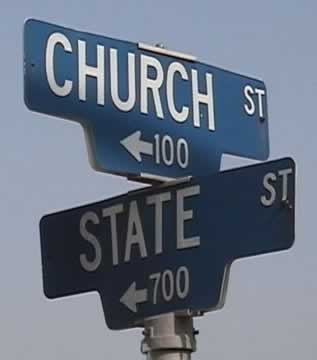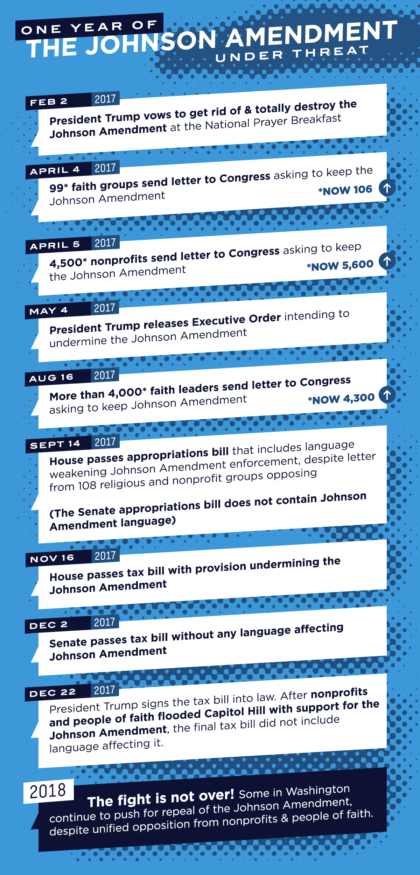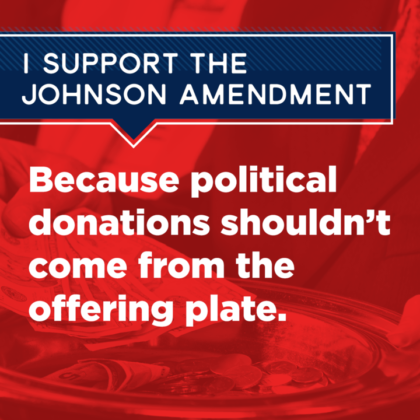Repeal of the “Johnson Amendment” may be included in the Omnibus Spending Bill which must pass by March 23.
Call and email your Senators NOW
Call your Senators by using the U.S. Capitol Switchboard: (202) 224-3121.
Ask them to support the current law that prohibits all tax-exempt organizations from endorsing and opposing candidates.

Page Contents (click on a title to go to that section):
- Action Needed NOW: What You Can Do
- What You Should Know
- Our UU Spiritual Grounding
- Resources and Relevant News Media Coverage Links
Action Needed NOW: What You Can Do
Organize a Write Here! Write Now! letter-writing table in your congregation for letters to be delivered to SENATE offices in Washington, DC.
Click here to download the letter-writing toolkit for organizers.
Click here to download WHWN two-page handout (sample message and talking points).
1 – Contact your Senators
Suggested message by phone or email:
Hi, my name is [your name]. I’m a constituent from [city, state]. I am a Unitarian Universalist from [name of congregation and location].
I support the separation of church and state as a constitutional principle that protects the freedom of religion. I urge you to support the current law that prohibits all tax-exempt organizations, including houses of worship, from endorsing and opposing political candidates, and oppose any attempt to attach a rider to the omnibus spending bill that would repeal or weaken the Johnson Amendment.
For decades, the Johnson Amendment has protected the independence and integrity of houses of worship and prevented them from being used as tools of political candidates and those seeking political power. Thank you.
U.S. Capitol Switchboard: (202) 224-3121
To find e-mail addresses and other contact information for your members of Congress, visit these Congressional websites:
2 – Ask your friends and family members to contact their Senators, too.
Send them the link to this page – http://bit.ly/2FZPFyO
3 – Spread the word – Post messages to social media (Facebook, Twitter, etc.).
Post links to this page – http://bit.ly/2FZPFyO
Tweet your Senators (click here to find their Twitter handles). Here’s a sample Tweet:
@(Senator’s Twitter Handle) Maintain #JohnsonAmendment. No anti-Johnson Amendment rider on the omnibus spending bill. #FaithVoices #CommunityNotCandidates #CleanBudget #NoDarkMoney http://bit.ly/2oN3byn
4 – Add your name to a faith-community letter
Faith leaders (ministers, religious educators, lay leaders, etc.) are welcome to sign this letter which is being updated and delivered to Members of Congress as long as there is a threat that the Johnson Amendment will be repealed or weakened.
What You Should Know
For more information, see the UUSJ sample message to Senators and talking points.
The Johnson Amendment regulates what tax-exempt organizations can do in the political arena and has been instrumental in establishing the nonprofit charitable sector as one of the only platforms of nonpartisan civic engagement in the United States.
Under terms of the 1954 legislation (named for its principal sponsor, then-Sen. Lyndon Johnson), all 501(c)(3) organizations, including houses of worship, are prohibited from endorsing political candidates. “Under the Internal Revenue Code, all section 501(c)(3) organizations are absolutely prohibited from directly or indirectly participating in, or intervening in, any political campaign on behalf of (or in opposition to) any candidate for elective public office,” according to the IRS website.
Organizations claiming tax-exempt status cannot collect contributions on behalf of political campaigns or make any statement for or against a particular candidate. Clergy are not allowed to endorse candidates from the pulpit.
The law is fairly narrow in scope. Nonpartisan voter education activities and church-organized voter registration drives are legal. Clergy are free to preach on social and political issues of concern. Churches can publish “issue guides” for voters. Polls show the vast majority of Americans support the Johnson Amendment.

Repeal of the Johnson Amendment is a top priority of the Trump Administration, GOP Congressional leaders and religious conservatives, and was nearly included in the 2017 tax bill. The Johnson Amendment is threatened now by spending bills and extraneous riders to other legislation seeking to completely repeal or substantially weaken this longstanding protection in the law. Although couched as attempts to promote religious freedom and free speech, the legislative proposals would have the effect of politicizing and thereby erasing the public’s high trust in charities, houses of worship, and foundations to benefit politicians and paid political consultants.
This is also about money and politics. Weakening or overturning the Johnson Amendment would have major implications for campaign finance. If churches or clergy are allowed to participate in political campaigns, tax-free donations to the churches could go to support a political candidate. Religious organizations could become bigger money players in politics. Repealing or loosening the “Johnson Amendment’s” prohibition on partisan political activities could lead to the creation of an array of new 501(c)(3) “super dark money groups”—groups organized as charities or religious organizations that will operate as tax-deductible vehicles for wealthy donors to secretly influence elections.
Sources: NPR, The Campaign Legal Center, GiveVoice.org
Our UU Spiritual Grounding
Since 1961, the Unitarian Universalist Association has passed over a dozen resolutions/statements pertaining to the separation of church and state.

Actions of Immediate Witness
- 2000 – Campaign Finance Reform
- 1998 – Political Campaign Finance Reform
Additional UU resources
- UU World – Winter 2007 – America’s founding faiths
- Church and State – Is the “Wall of Separation” Crumbling? Homily – July 3, 2011 – by Steve Scott, Columbia, MO
Resources and Relevant News Media Coverage Links
- Faith Voices – add your name to a letter signed by over 4,300 faith leaders telling Congress to protect the independence and integrity of houses of worship
- Americans United for Separation of Church and State
- Project Fair Play – polls show vast majority of Americans support the Johnson Amendment
- Baptist Joint Committee
- National Council of Nonprofits
- NPR – The Johnson Amendment In 5 Questions And Answers
- Washington Post – Provisions attached to budget bills could reshape campaign finance laws
- Los Angeles Times editorial – Don’t weaken the ban on politics in the pulpit
- The Atlantic – Trump Wants to Make Churches the New Super PACs

